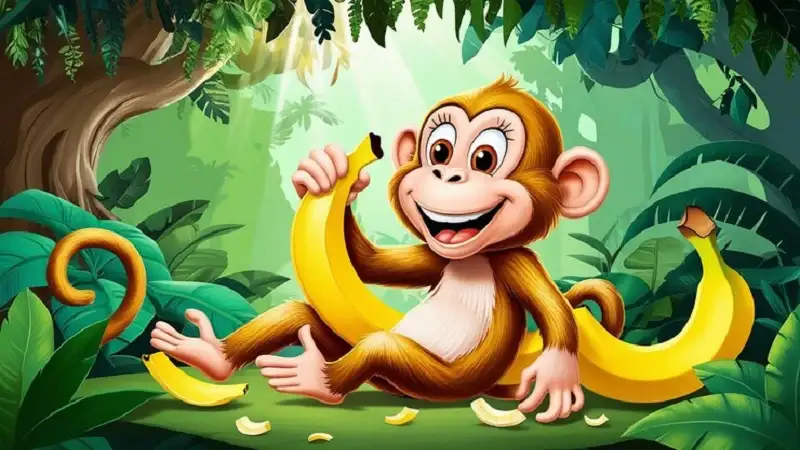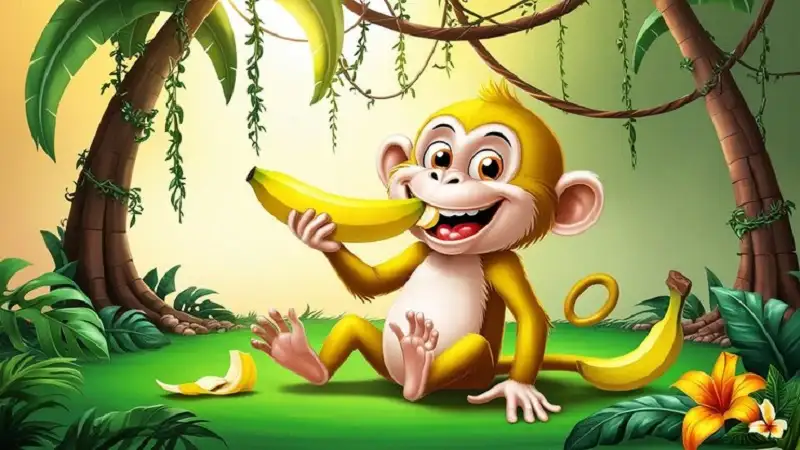Bananas and monkeys—these two are often inseparable in popular imagination. The quirky image of a monkey enjoying a banana has become a cliché in both media and everyday conversation. But how accurate is this perception? Let’s dive deep into the curious relationship between bananas and monkeys and explore the truth behind the often-debated phrase “Banana:b4hnuk08dew= Monkey.”
Introduction to the Myth: “Banana:b4hnuk08dew= Monkey”
At first glance, “Banana:b4hnuk08dew= Monkey” seems like a string of random characters, but it’s actually a playful take on the longstanding association between monkeys and bananas. The phrase could be interpreted as a representation of how closely linked the two are in the public’s mind, often in a humorous or exaggerated way. Whether you’re a meme lover or simply curious, this code-like phrase has become a part of internet culture, sparking conversations around the supposed obsession monkeys have with bananas.
The Popularity of Bananas in Monkey Diets
Why Bananas? Nutritional Benefits for Monkeys
So, why do we picture monkeys snacking on bananas? It turns out there’s some nutritional logic behind it. Bananas are high in potassium, vitamin B6, and fiber, all of which contribute to a healthy diet for primates. For monkeys, bananas are not just a sweet treat—they’re a nutrient-dense food source that offers quick energy boosts due to their high sugar content.
Evolutionary Preference: A Natural Love for Sweetness
Monkeys, like humans, are biologically wired to enjoy sweet foods. In the wild, sweetness can signal ripe and nutrient-rich fruit, which explains why bananas are so appealing. It’s not just an internet meme—there’s actual science behind monkeys’ attraction to sweet fruits, including bananas.
The Origins of the Phrase: “Banana= Monkey”
Breaking Down the Meaning Behind the Code-Like Phrase
The phrase “Banana:b4hnuk08dew= Monkey” appears to combine randomness and a clever nod to internet culture. It symbolizes the endless association of monkeys with bananas, often played out in memes and humorous videos. By giving it a code-like structure, it hints at how much of this connection has become embedded in pop culture and digital spaces.
Cultural Interpretations and Internet Memes
The internet has taken the monkey-banana connection to the next level, transforming it into an iconic part of meme culture. From viral videos of monkeys eating bananas to animated shows where monkeys carry bananas around, this humorous pairing has captured imaginations worldwide. The phrase encapsulates this cultural phenomenon in a way that blends humor with intrigue.
Bananas in Monkey Habitats: How Accurate is This Stereotype?
Monkey Diet Diversity in the Wild
Contrary to popular belief, monkeys in the wild don’t rely solely on bananas for sustenance. Their diet is much more varied and includes fruits, leaves, insects, and even small animals, depending on the species. While bananas are indeed a tasty treat for them, it’s not their primary food source.
Do Monkeys Really Prefer Bananas Above Other Foods?
Surprisingly, research shows that while monkeys enjoy bananas, they often prefer other fruits when given a choice. Fruits like mangoes, berries, and figs can be more appealing in natural environments. The emphasis on bananas in captivity or tourist spots tends to exaggerate the preference.
The Science Behind Bananas and Monkey Health
The Nutritional Breakdown of Bananas
Bananas are packed with essential nutrients like potassium, which supports nerve and muscle function, and vitamin C, important for immune health. But are they the best food for monkeys? The sugar content in bananas is high, which can sometimes lead to health issues for monkeys when they are overfed in zoos or parks.
What Other Fruits Do Monkeys Consume?
Monkeys enjoy a wide range of fruits beyond bananas, including apples, grapes, papayas, and melons. Their natural habitats often provide them with a greater variety of fruits than what we commonly associate with them in captivity.
A Closer Look at the Diets of Different Monkey Species
Old World Monkeys vs. New World Monkeys: Different Preferences
Different species of monkeys have different dietary preferences. Old World monkeys, like baboons, might lean toward roots and shoots, while New World monkeys, like capuchins, have a broader taste for fruits, nuts, and insects.
How Monkeys Forage in Their Natural Environments
In the wild, monkeys have to work for their food, foraging from various sources like trees, bushes, and even the ground. This natural behavior ensures a balanced diet, which is far more varied than the simple image of a monkey with a banana.
The Role of Bananas in Zoos and Captive Environments
Dietary Control and Nutritional Balance
In captivity, zoos and sanctuaries carefully control the diets of their monkeys to avoid overconsumption of sugar from bananas. While bananas are still offered, they are part of a larger, more balanced diet plan to keep the animals healthy.
Why Zoos Limit Banana Consumption for Monkeys
Bananas are limited in zoos because their high sugar content can cause health problems like obesity or tooth decay in captive monkeys. Instead, they are used as occasional treats or for training purposes.
The Impact of Human Influence on Monkey Eating Habits
Monkeys in Tourist Areas: A Closer Look at Unnatural Diets
In places where tourists regularly feed monkeys, the animals can develop an unhealthy dependence on human-provided foods like bananas, chips, and other processed snacks. This disrupts their natural foraging behavior and can lead to poor health.
Are Bananas Becoming a Symbol of Human Interaction with Wildlife?
Bananas have become a symbol of human interaction with monkeys, often used as a way to attract or entertain them in tourist areas. However, this has sparked discussions about the ethics of feeding wildlife and the potential harm it may cause.

Monkey Behavior: Why They Are Drawn to Bananas
Sweetness as a Reward in Training and Entertainment
Bananas are commonly used as rewards in monkey training because of their appealing sweetness. Trainers and zookeepers use bananas as positive reinforcement to encourage good behavior in monkeys.
Monkey Cognitive Reactions to Bananas
Monkeys exhibit excitement and anticipation when presented with bananas, highlighting their cognitive abilities. This reaction has been captured in countless videos, fueling the perception that bananas are a monkey’s favorite food.
Bananas and Monkeys in Popular Culture
The Stereotype in Cartoons and Media
From classic cartoons to modern movies, monkeys and bananas have been a staple of entertainment for decades. Characters like Curious George or King Louie from The Jungle Book have cemented the idea that monkeys love bananas.
Internet Memes: How the Idea Spread Globally
The internet has played a huge role in spreading and exaggerating the connection between monkeys and bananas. Memes featuring monkeys eating or interacting with bananas have become viral sensations, reinforcing this playful stereotype.
Conclusion
In summary, the association between monkeys and bananas is deeply embedded in both culture and science. While bananas are a favored treat due to their sweetness and nutritional value, monkeys’ diets are far more complex. The phrase “Banana:b4hnuk08dew= Monkey” may seem nonsensical at first glance, but it speaks to the fun, curiosity, and intrigue that exists around this unique relationship. Read More lifestyledod.
FAQs
1. Do all monkeys eat bananas?
No, not all monkeys eat bananas, and in the wild, their diets are much more diverse.
2. Why do we associate monkeys with bananas?
This association comes from both their natural preference for sweet fruits and their portrayal in popular media.
3. Are bananas bad for monkeys?
In moderation, bananas are healthy for monkeys, but overfeeding them, especially in captivity, can lead to health issues.
4. Do monkeys eat other fruits?
Yes, monkeys consume a variety of fruits like apples, berries, and figs in their natural environments.
5. Why are bananas used in monkey training?
Bananas are used because their sweetness makes them an effective reward for positive reinforcement.
